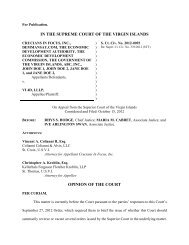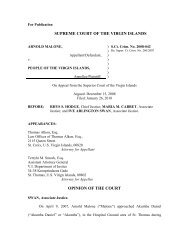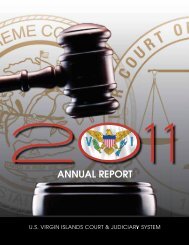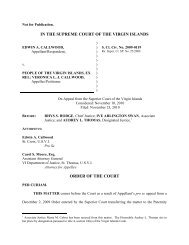Watts v. Two Plus TwoS. Ct. Civ. No. 2007-0127Opinion of the CourtPage 6 of 10The Superior Court did, however, consider and weigh the Halliday factors with respect toTwo Plus Two. Nevertheless, this Court cannot conclude that the Halliday factors, whenproperly balanced, strongly weigh in favor of dismissing Watts’s action for failure to prosecutewith respect to Two Plus Two. In its October 19, 2007 Order, the Superior Court expresslyheld—and the parties do not dispute on appeal—that there is “little direct evidence” that Watts,as opposed to his counsel, is “personally responsible for failing to prosecute this matter,” (J.A. at5), and that the allegations in Watt’s pleadings, “if established at trial, would support recovery by[Watts].” (J.A. at 9.) Given that these two factors do not favor dismissal at all, the remainingfour Halliday factors would have to very heavily favor dismissal for the Superior Court toproperly exercise its discretion to dismiss Watt’s action. We hold that, although two of theHalliday factors support dismissal, they do not favor dismissal to such an extent that the SuperiorCourt, when balancing all six factors, could have permissibly imposed that sanction in lieu of alesser sanction.With respect to the second factor—prejudice to Two Plus Two—the Superior Courtcorrectly recognized that prejudice “does not mean ‘irremediable harm,’ but the ‘burden imposedby impeding a party’s ability to prepare effectively a full and complete trial strategy issufficiently prejudicial.’” (J.A. at 5 (quoting Majestic Const., Inc. v. JCB Int’l, Inc., No. 2003-159, 2006 WL 2462639, at *3 (D.V.I. App. Div. 2006).) Although Watts contends on appealthat his inaction should be excused because Two Plus Two also did not file its Fed. R. Civ. P. 26initial disclosures, a plaintiff’s failure to file Rule 26 disclosures inherently impedes adefendant’s ability “to prepare effectively a full and complete trial strategy.” Carter v. RyobiTechtronics, 250 F.R.D. 223, 229 (E.D. Pa. 2008) (quoting Ware v. Rodale Press, Inc., 322 F.3d218, 222 (3d Cir. 2003)). Moreover, unlike a plaintiff, a defendant possesses no affirmative duty
Watts v. Two Plus TwoS. Ct. Civ. No. 2007-0127Opinion of the CourtPage 7 of 10to take any steps to bring a case to trial prior to filing a motion to dismiss for failure to prosecute.See Ely Valley Mines, Inc. v. Hartford Acc. and Indem. Co., 644 F.2d 1310, 1317 (9th Cir. 1981)(“Although delay caused by a defendant may be considered by the court, the primaryresponsibility for furthering a case is upon the plaintiff and his attorney.”) (citing BendixAviation Corp. v. Glass, 32 F.R.D. 375, 377 (E.D. Pa. 1962), aff’d 314 F.2d 944 (3d Cir. 1963),cert. denied 375 U.S. 817, 84 S.Ct. 51, 11 L.Ed.2d 52 (1963)); Finley v. Parvin/Dohrmann Co.,Inc., 520 F.2d 386, 392 (2d Cir. 1975) (“[T]he failure of a defendant to call the court's attentionto a plaintiff's undue delay in bringing a case on for trial, by formal motion or otherwise, may beconsidered as a factor in informing the court's discretion. Of course, such action by a defendantis not a necessary condition to subsequent dismissal.”); Ternes v. Knispel, 374 N.W.2d 879, 881(N.D. 1985) (“Ternes argues the trial court erred in dismissing his action because Knispel has notcompleted discovery and therefore could not object to any delay in the prosecution. However, theduty to prosecute rests with the plaintiff, not the defendant. . . . There was no reason for Knispelto incur the expense and inconvenience of conducting discovery if Ternes' inaction gave him thehope or expectation that the case would never be tried.”). Accordingly, the Superior Court didnot err when it held that the lack of any meaningful discovery in the four years since thecomplaint had been filed prejudiced Two Plus Two.However, while the fact that Two Plus Two was prejudiced results in the second Hallidayfactor favoring dismissal, the Superior Court was also required to determine the extent of thatprejudice in order to determine how heavily to weigh that factor as part of its balancing test.Although the Superior Court noted that almost five years had elapsed since the December 29,2002 altercation between Watts and Bell and that such delay could cause memories to fade andperceptions of events to be altered, (J.A. at 6), Two Plus Two never alleged in its July 16, 2007
- Page 1 and 2: For Publication.IN THE SUPREME COUR
- Page 3 and 4: Watts v. Two Plus TwoS. Ct. Civ. No
- Page 5: Watts v. Two Plus TwoS. Ct. Civ. No
- Page 9 and 10: Watts v. Two Plus TwoS. Ct. Civ. No
- Page 11 and 12: SWAN, Associate Justice, concurring
- Page 13 and 14: Watts v. Two Plus Two, Inc.S.Ct. Ci
- Page 15 and 16: Watts v. Two Plus Two, Inc.S.Ct. Ci
- Page 17 and 18: Watts v. Two Plus Two, Inc.S.Ct. Ci
- Page 19 and 20: Watts v. Two Plus Two, Inc.S.Ct. Ci
- Page 21 and 22: Watts v. Two Plus Two, Inc.S.Ct. Ci
- Page 23 and 24: Watts v. Two Plus Two, Inc.S.Ct. Ci
- Page 25 and 26: Watts v. Two Plus Two, Inc.S.Ct. Ci
- Page 27 and 28: Watts v. Two Plus Two, Inc.S.Ct. Ci
- Page 29 and 30: Watts v. Two Plus Two, Inc.S.Ct. Ci
- Page 31 and 32: Watts v. Two Plus Two, Inc.S.Ct. Ci
- Page 33: Watts v. Two Plus Two, Inc.S.Ct. Ci
















